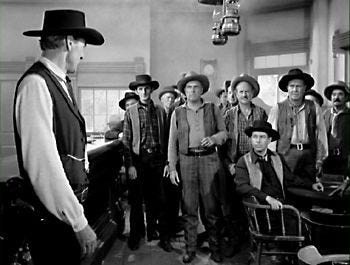In the 1952 movie High Noon, Gary Cooper plays a retired town Marshall who decides that he must face off against a gang member who is returning to town. The Marshall’s new bride is a pacifist and doesn’t want him to face this villain. Also discouraging is that the townspeople will not stand by him. He must face the gang alone.
High Noon is a classic movie. Simple. Powerful. And wrong.
In fact, the entire popular narrative of the “Wild West” is almost purely an invention of Hollywood, based on an assumption that many agree with. Since established governments were hundreds or thousands of miles away, the frontier (frontier towns, wagon trains, cattle drives, mining camps, and so forth) was effectively in a state of anarchy. Therefore, they were obviously in chaos, with men being gunned down in broad daylight on a regular basis in a lawless atmosphere.
The only problem with this simple bit of political reasoning is that this isn’t what actually happened. The period on the frontier from 1830 to 1900 was marked instead by protection of property rights and civil order.
Pioneer settlers often did not have official sanction to use the land they moved to, so land disputes occurred frequently. The solution would be a land club that “adopted its own constitution and bylaws, elected officers for the operation of the organization, established rules for adjudicating disputes, and established the procedure for the registration and protection of claims.” One non-violent sanction that these associations would use was a boycott of anyone who would not respect the claims of settlers. To lose the ability to trade with one’s neighbors on the frontier was to be put in a very precarious position indeed.
These associations were highly effective. Historian Frederick Jackson Turner extolled them for demonstrating the “power of the newly arrived pioneers to join together for a common end without the intervention of governmental institutions.”
More violent was the private enforcement among cowboys. Cattlemen’s associations were created quite quickly after cattle drives started in the West. These entailed the hiring of stock detectives who would ensure that everyone only possessed the cattle that he himself owned, and none others. An example is “Bill,” who “became Montana’s first stock detective… he became a hired defender of property rights, and he executed his assignments — as well as his quarry — with thoroughness and dispatch.”
Not all of this organization occurred after arrival on the frontier. Folks heading to the frontier on wagon trains knew that they would eventually pass “beyond the pale of law,” so they would organize themselves ahead of time. They wrote up constitutions before setting out, which included things like “organization of jury trials; regulation of Sabbath-breaking, gambling, and intoxication; and penalties for failing to perform chores, especially guard duty.”
In one case, despite arbitration arrangements being in place, a wagon train could not reach an agreement with one of its members who wouldn’t do chores:
We concluded the best thing we could do was to buy him out and let him go which accordingly we did by paying him one hundred doll[ar]s. He shoulder[ed] his gun, carpet bag, and blanket and took the track to the prairie without saying good by[e] to one of us.
So the truth of what happened on the frontier is not just completely different from Hollywood westerns. It is rather encouraging: set a bunch of Americans in a wilderness, and they don’t descend into Lord of the Flies chaos. Instead, they organize, establish justice, and start building civilization.
More Information
My video on this topic: “Not So Wild West”
“The Not So Wild, Wild West” by Terry Anderson and P.J. Hill
Terry Anderson and P.J. Hill. The Not So Wild, Wild West: Property Rights on the Frontier (Stanford, California: Stanford Economics and Finance, 2004)





Excellent article.
Growing up near Tombstone Arizona, yes THAT Tombstone, I also lived in Globe Arizona, both frontier mining camps. Good article, but I should point out that these towns had the reputation they had for good reasons. Mark Twain comment about Virginia City is pertinent,
“Money was as plenty as dust; every individual considered himself wealthy, and a melancholy countenance was nowhere to be seen. There were military companies, fire companies, brass bands, banks, hotels, theaters, “hurdy-gurdy houses,” wide-open gambling palaces, political powwows, civic processions, street fights, murders, inquests, riots, a whiskey mill every fifteen steps, a board of alderman, a mayor… a dozen breweries and half a dozen jails and station houses in full operation, and some talk of building a church. The “flush times” were in magnificent flower! Mining camps had a reputation for violence, young men, a strong male honor culture,whiskey, dangerous mines, it was “ Hell on women and horses” they said. It really wasn’t till settlers with their families arrived, along with organized religion that things calmed down. Your right though, Hollywood lies...